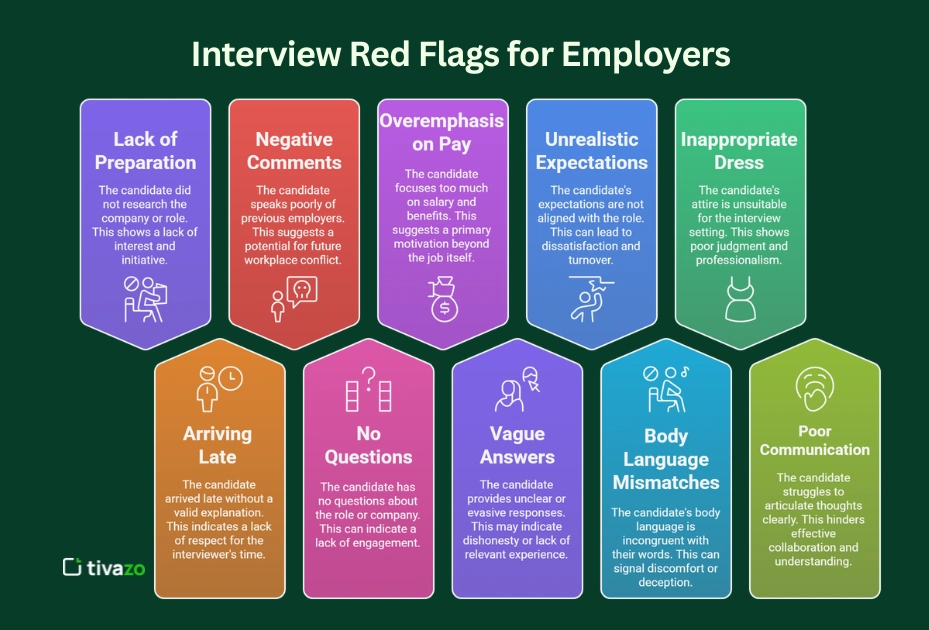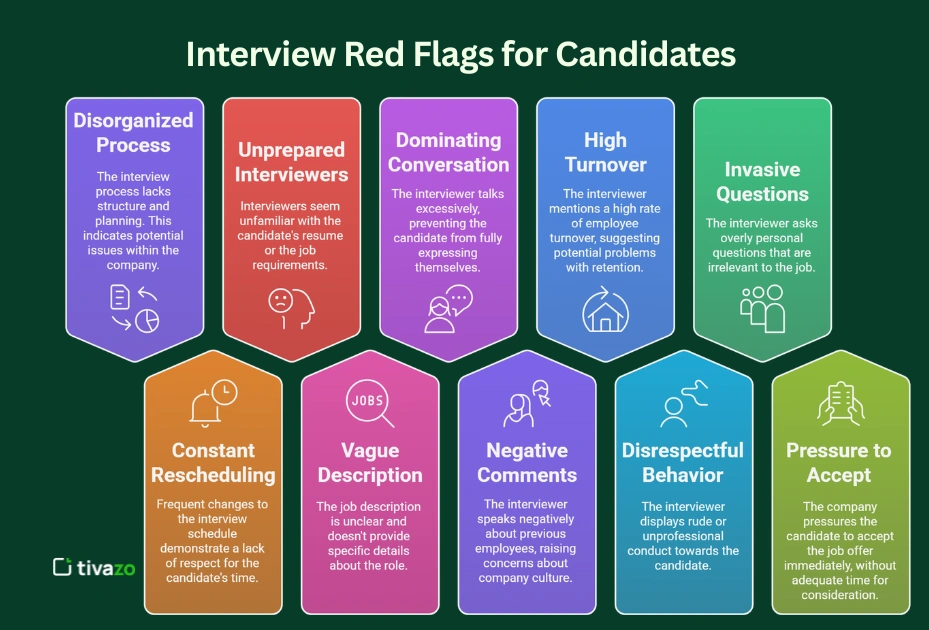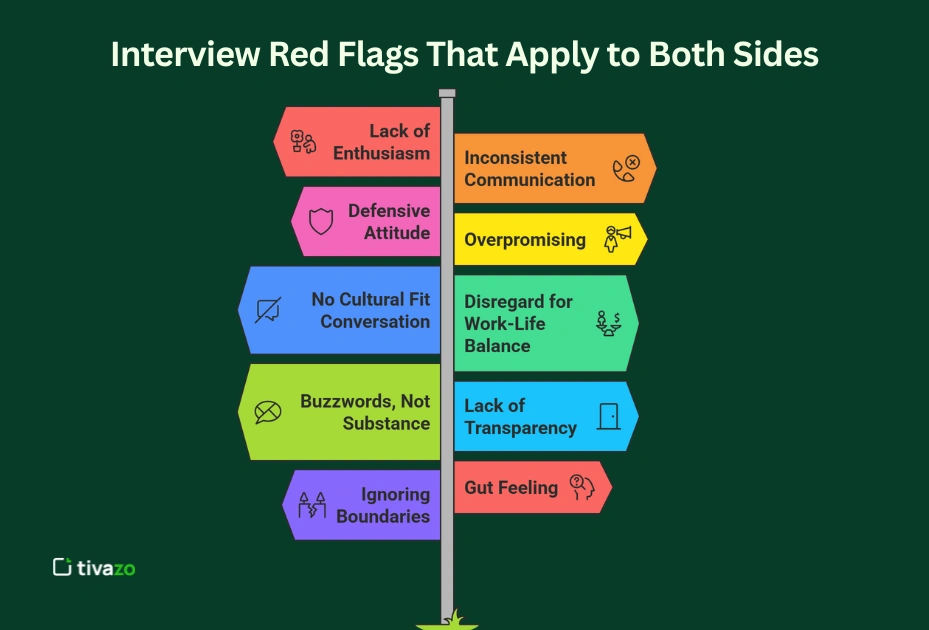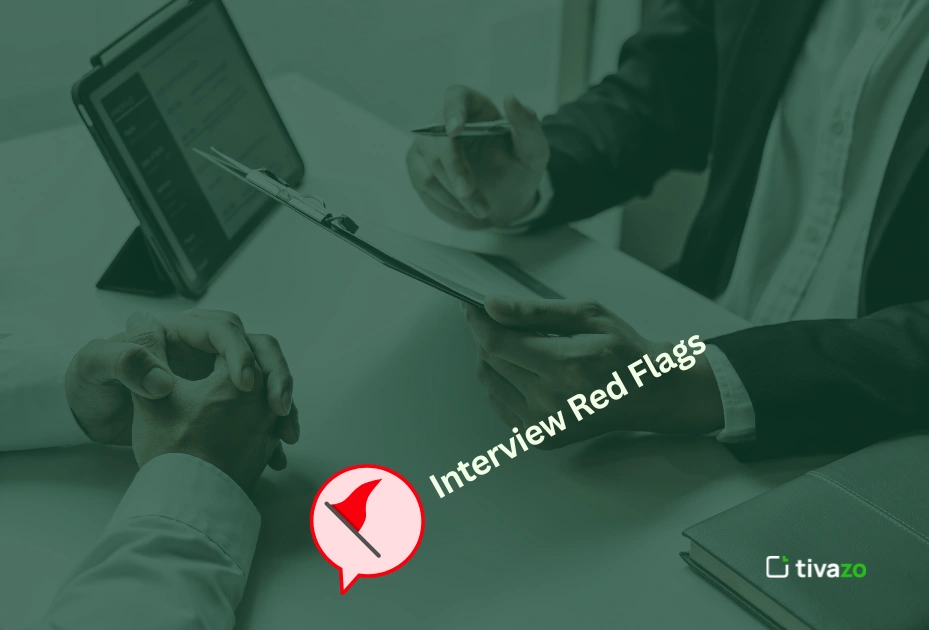The formal conversation that takes place at an interview is a critical opportunity for both the candidate and employer to assess each other. In the best-case scenario, an interview would be a productive and seamless experience that assists both parties in making an informed decision. However, there are subtle signs that can indicate that something may not be ‘quite right’. These signs may be referred to as interview red flags.
Regardless if you’re a candidate or hiring manager, being able to recognize interview red flags will help prevent a poor hire, a toxic work environment or an ill-fitting role. Red flags can exist in many forms; be it vague responses, poor communication, or wildly unrealistic expectations, they should not be ignored.
In this blog, we will discuss 30 examples of interview red flags from the perspective of both the candidate and interviewer in great detail. You will learn about recruitment red flags, and how to improve your hiring process to prevent it from going belly up, and to improve the overall interview experience.
Key Takeaways:
- Section 1: Interview Red Flags for Employers (What to Watch in Candidates)
- Section 2: Interview Red Flags for Candidates (What to Watch in Interviewers)
- Section 3: Interview Red Flags That Apply to Both Sides
- Final Thought
- FAQs:
Section 1: Interview Red Flags for Employers (What to Watch in Candidates)

Hiring the right candidate is more in-depth than looking through a resume. Interviews give us additional insight into candidates’ behavior, mindset and fit with your team. While some candidates come to the interview prepared and polished, others have areas of concern that should be addressed. These interview red flags, such as poor preparation, from the candidate’s point of view, to vague answers, can be early signs of problems with future communication, professionalism and reliability. Here are 10 red flags that employers should be aware of when reviewing candidates:
1. Lack of Preparation
If a candidate arrives at an interview without any knowledge of your company, its mission, or the role that they have applied for, it can be a significant interview red flag. It represents poor research, of course, but also lack of interest, effort or even seriousness about the role. A confident and prepared candidate will arrive informed, will ask clarifying questions and will express their interest in the company or role.
2. Arriving Late Without Valid Reason
The most glaring red flag of punctuality is a late candidate without a viable or reasonable explanation during an interview. In general, when candidates arrive late, it usually is a strong indication of their time management, professionalism and respect for others time. Forwardness and punctuality during an interview, especially when a commitment is made or implied is one of the most visual red flags of a candidate.
3. Speaking Negatively About Past Employers
Speaking ill of your former employer or boss during an interview might be a serious hiring red flag. If so, you could be seen as immature, or unable to manage conflict, or maybe you prefer to point fingers instead of taking ownership for your decisions. Professional candidates will try to keep it constructive, even if they left the worst workplace imaginable.
4. No Questions for the Interviewer
Not asking any questions whatsoever leads to concerns that you may not be curious, or even engaged in the conversation. When a candidate is enthusiastic, they want to understand what the internal company culture is like, what the team dynamic is, and if there are chances for personal/professional growth. A blank stare from you at the end of an interview is one of the more subtle yet serious interview red flags.
5. Overemphasis on Pay and Benefits
While certainly part of any offer, If a candidate goes too far down the path of pay and benefits too early in the process, it may also suggest they are more driven by money alone and not by passion or purpose. This is one of the more prevalent recruitment red flags that employers face.
6. Vague or Evasive Answers
A candidate that cannot clearly articulate past job duties, past job achievements, or future career goals might not be completely truthful, or just lacks experience altogether. Watch for interview warning signs such as avoiding direct answers to interview questions or using too much jargon without actual examples.
7. Unrealistic Expectations
When a candidate expects to be promoted quickly, earn top-dollar salary, and receive the same perks and authority as an executive immediately, they are likely out of touch with the realities of the role and/or your industry’s realities. These interview red flags show signs of entitlement and ignorance towards professional standards and roles.
8. Body Language Mismatches
Nonverbal communication tells a powerful story. Like poor eye contact, posture, fidgeting excessively, or overly visible nervousness could really indicate discomfort or insecurity. A lot of candidates get nervous, so it is a common tendency, however, major body language red flags should be evaluated along with verbal performance.
9. Inappropriate Dress Code
You only get one chance to make a first impression. If you show up underdressed or dressed sloppily to a professional interview, it shows a clear disregard for the significance of the occasion, as well as poor judgment. It is the bare minimum to dress appropriately for an interview and anything less than that, is a clear candidate red flag.
10. Poor Communication Skills
Only a small number of occupations do not require effective communication skills. If a candidate appears unable to adequately express their thoughts, excessively uses filler words, or cannot stay “on topic”, that is a huge red flag. If you’ve never interviewed anyone, you may not recognize the way communication disconnects during an interview can lead to work-related ineffectiveness—therefore, it is one of the biggest interview red flags to be mindful of.
Section 2: Interview Red Flags for Candidates (What to Watch in Interviewers)

It can be easy as a job seeker to think that all you need to do is impress your interviewer as well as your potential employer; but, it is equally important that you assess the company during the interview process. Your prospective employer is evaluating you, and you should be utilizing the interview process to look for employer-side red flags that may indicate the position may not be a good fit for you. As you are being evaluated, you should be evaluating for interviewer red flags that may suggest lack of organization, respect, or potential longevity in that role. Here are ten signs that all job candidates should look for:
11. Disorganized Interview Process
Disorganization should be a red flag, and if your interview looks disorganized—lots of last-minute changes, no agenda, or mixed messages—from your interviewers—it could be reflective of poor internal processes. An unorganized interview is usually a recruitment red flag that candidates encounter early on, and could be representative of larger structural issues.
12. Constant Rescheduling
Rescheduled interviews may happen here and there. However, when an interview is rescheduled a lot, it shows disorganization, poor planning, or a complete disregard for your time. This is a major interview red flag that may indicate ongoing communication issues.
13. Unprepared Interviewers
It’s disrespectful and unprofessional when an interviewer hasn’t even read your resume – or seems not to have even read your application. Interviewer red flags like that hint that they may not even care about their own hiring process – or about future team members.
14. Vague Job Description
If interviewers cannot clearly articulate the expectation and responsibilities of the role, you run the risk of accepting a position with moving parameters. There are a lot of vague job descriptions, and very often this is a hiring red flag from the interview and a sign of internal confusion or bad planning.
15. Interviewer Dominates the Conversation
By definition, interviews are conversations, not lectures. When an interviewer talks the whole time without giving you an opportunity to ask questions, that is a hiring red flag. This dynamic suggests a top-down, non-collaborative culture.
16. Negative Comments About Former Employees
Hearing an interviewer demean previous staff is a red flag regarding culture and professionalism. Some candidate red flags include talking badly about previous bosses, candidates can and do get blackballed by others due to talking badly about others; the same can happen for employers, and could indicate what you are getting into.
17. High Turnover Mentioned
If turnover is mentioned casually – or you experience several people that you learn do not stay long with the company, you should ask some follow-up questions to learn more about this. High turnover is a huge red flag for most interviews and usually only allude to larger issues like poor morale, bad or absent management, or inconsistent or overwhelming workloads.
18. Disrespectful Behavior
Interrupting, ignoring what you said, and looking at a phone or other device while you are responding is disrespectful behavior. Although these signs can be subtle, they are among the most critical interview red flags that can indicate how other members of the organization might be treated internally.
19. Overly Personal or Invasive Questions
Questions about your marital status, religion, age, or children’s plans are not only inappropriate, they may be illegal. These types of interview red flags are indicative of a company operating from old-fashioned and/or discriminatory practices.
20. Pressure to Accept Quickly
If you feel pressure to accept a job offer quickly, this could indicate something about the company is being hidden from you. A transparent and respectful organization will give you the time to consider the offer and ask questions and give you the space to make the best decision for yourself. In some ways, pushiness is one of the more acute warning signs of hiring red flags.
Section 3: Interview Red Flags That Apply to Both Sides

Some red flags during the interview process apply to both sides of the interviewing table; they are shared red flags. These red flags can highlight deeper issues based on culture, ethics, or communication styles. Each of the following warns signs can affect your conduct during the interview, and they should be exercised with absolute vigilance:
21. Lack of Enthusiasm
Low energy, monotone answers, or general disinterest by either party is serious warning sign. Zero enthusiasm – on the part of the candidate or the interviewer – can indicate a lack of cultured fit, disengagement, or lack of interest in the position or organization.
22. Inconsistencies in Communication
Conflicting information, changing expectations or vague answers can raise trust and professionalism issues. If the information you were told about the job situation changes over a period – or is very vague – then it is a red flag on mutual terms. Consistent and clear communication is the cornerstone of a successful working relationship.
23. Defensive Attitude
If either the candidate or the interview becomes defensive about basic questions, it can indicate issues related to feedback, stress or openness to dialogue. This one of the more clandestine red flags during an employment interview, but impactful when trying to look into the future and can cause frustrations later on.
24. Overpromising
The concept of overpromising includes candidates providing a job history that exceeds their actual skillset for the job or the hiring employer overstating their job or workplace. These are interview red flags. We may not know what to expect of someone new once they start, but we have a good chance of evaluating their foul and continue to foul whether it’s an underwhelming or job-ending foul. When hiring from a pool of interviews, disappointment from both parties can arise unexpectedly, which is especially common with scenarios before someone starts.
25. No Cultural Fit Conversation
Cultural fit is a strong determinant of job satisfaction, team effectiveness, and retention. If neither party discusses team culture, team dynamics, values, or workplace culture—this can be a serious red flag and missed opportunity. When cultural fit is not deemed important for hiring, turnover is a high probability.
26. Disregard for Work-Life Balance
If a candidate brags about a 24/7 hustle, or a hiring employer shares that we should always be “on” along with comments during interviews, take note and consider these serious red flags. Long-term engagement and performance requires healthy boundaries and work-life balance.
27. Talking in Buzzwords, Not Substance
When a person uses phrases like “we wear many hats” or “we work hard, play hard” with no content, it could be a sign of something wrong. Whether it is the candidate or the interviewer, if they are relying unaware with buzzwords and not providing any tangible examples in their explanations, it is a hiring period red flag that shows lack of clarity.
28. Lack of Transparency About Next Steps
Regardless, both candidates and employers should know where we go from here. If timelines, role descriptions, or any expectations remain ambiguous, it is a red flag. Next steps stated in detail above show professionalism as well as respect for time.
29. Ignoring Boundaries
Boundaries are boundaries. If interviewers are scheduling interviews late at night, or if candidates are communicating with individuals outside of professional boundaries, it is certainly a big interview red flag. Not respecting your boundaries is a big indicator that workplace conflicts/stresses are likely to occur.
30. Gut Feeling Something’s Off
Finally, trust your instincts. If something is off, whether it is behavior, energy, or tone, you should take note of it. Often, your gut instinct is your first and most demanding protection against quality decision-making. Gut feelings should never be brushed aside as red flags while interviewing for jobs.
Final Thought
Keeping an eye out for interview warning signs is important for both job seekers as well as hiring managers. These signs (both subtle and not-so-subtle), help avoid hiring mistakes, limit turnover, and ultimately help individuals avoid toxic situations. For candidates, paying attention to interviewer warning signs will help you avoid taking a job that doesn’t fit your values, goals, or mental health. For employers, spotting candidate warning signs early will help you avoid onboarding someone who is unprofessional, unethical, or doesn’t have long term-staying power.
Remember, interviews are not all about the interviewer’s evaluation of you—it’s a 2-way street. Respect, clarity, and transparency in an interview process are not negotiable. Once those attributes start to disappear, interview warning signs become a reality, and you need to pay attention. Learning to recognize, but also act on recruitment red flags, gives you the knowledge and assurance needed to make a rational, confident decision.
Lastly, listen to your instincts. If someone seems off—even though it checks every box on paper—that gut instinct may be your best asset in the entire hiring process.
FAQs:
What is a red flag in an interview?
A red flag is a warning sign during an interview that indicates potential issues, such as poor communication, no preparation, or misaligned expectations, which may create an undesirable hiring decision or job fit.
What is the biggest red flag to hear when being interviewed?
One of the biggest red flags would be if any negative or disrespectful comments are made about previous employees or the company culture itself. More often than not, these comments herald a toxic workplace or poor management.
How can I tell if an interview went badly?
Other common indicators would be dismissive answers, both parties showing a lack of enthusiasm, vague responses about the next steps, and a general feeling of lack of connection and no clarity.
What are the most concerning interview red flags for hiring managers?
The top complaints hiring managers note include lack of preparation, poor communication skills, unrealistic expectations, and negative attitudes toward past employers.
What is a “red flag interview”?
A red flag interview is one where either the candidate is showing signs, or the interviewer shows signs that may impact the candidate's fit, professionalism, or culture.




